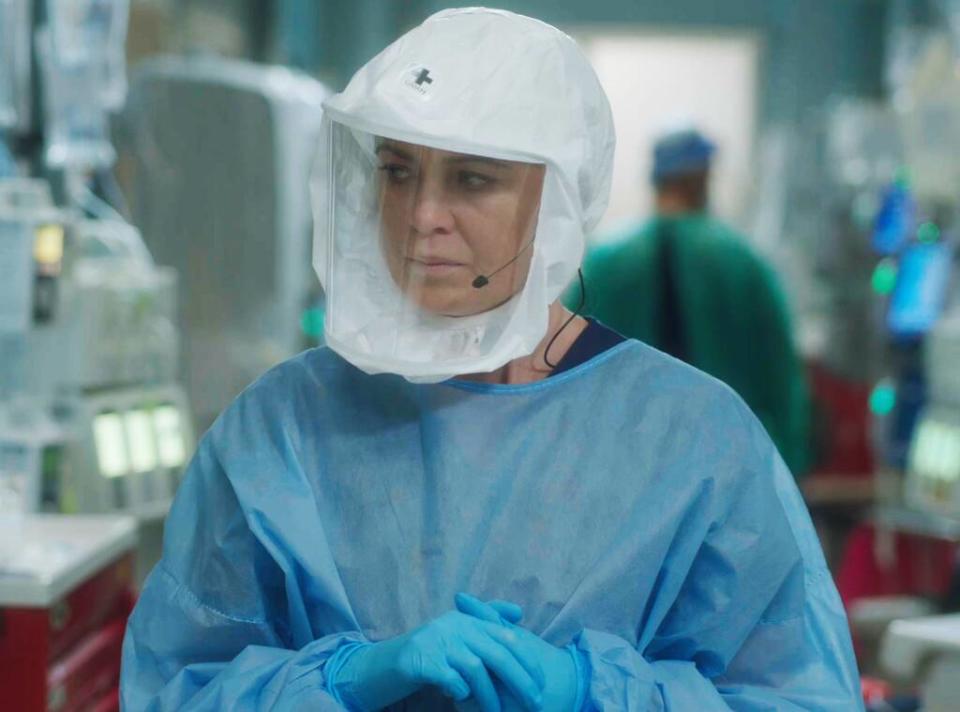Grey’s Anatomy ’s Medical Expert Explains the Science Behind Meredith’s COVID-Induced Dreams
First Derek Shepherd, now George O'Malley.
After Thursday night's episode of Grey's Anatomy, fans are eager to know what other actors aside from Patrick Dempsey and T.R. Knight could return to the hit medical drama during season 17. Yes, Ellen Pompeo's Meredith has COVID-19 and as a result is experiencing lucid dreams where she heads to the beach and finds comfort characters from her past. And while the guesses and theories continue, let's reflect on why, exactly, Meredith is having these experiences.
In an extensive interview with The Hollywood Reporter, Dr. Zoanne Clack, a writer, executive producer and real-life doctor on Grey's Anatomy, opened up about the show's portrayal of the coronavirus and just how accurate it is that wild dreams are a symptom of the virus.
"From the small amount of research that I've done on visceral ‘COVID dreams,' they seem to be the stuff of non-COVID victims, just people going through this pandemic, whether they have COVID or not," she said. "We actually started early in the season talking about different characters having very vivid, very surreal COVID dreams in each episode, but it evolved to what you see on screen."
Grey's Anatomy's Departed Doctors: Where Are They Now?
Clack continued, "Mer's COVID dreams are more like her experience in season three, where she's kind of in limbo between life and death, holding on to one and reaching out to the other. And it's a chance to bring some joy into the abyss that is COVID and that is 2020. I loved how people on Twitter were saying that Grey's saved 2020 for them. One of our writers said we were making America Grey's again."
Elsewhere in the interview, Clack explained why it was so important for herself, showrunner Krista Vernoff and the rest of the Grey's team to accurately depict COVID.

"We were definitely concerned about COVID fatigue from the audience: living with COVID news day-to-day and watching it on a fictional show was a hard barrier to cross. But talking to front-line health care workers pushed us forward onto our current path," she said, explaining that she and the writers constantly consult physicians to make sure the storytelling is right.
"This pandemic is the single-biggest medical story of our time and likely a permanent game-changer as to how we practice medicine and how we look at the world," she said. "Being a medical show that focuses on our doctors' professional and private lives and one that takes great pride in being a voice for the voiceless and understanding that responsibility, we felt compelled to tell the stories of loneliness, fear and bravery that our health care workers and the patients are going through."

Clark said they were definitely "scared that people would not want to go through the misery of COVID once more," but that they've managed to achieve a nice balance. "As I've heard people say, COVID is no. 1 on the call sheet," she explained. "I also believe that going through the pandemic with these characters, whom people love dearly—or love to hate—makes the audience feel like they're going through it with friends, which makes me think it is felt more deeply, and not just a rehash of the constant roll of statistics and mortality rates."
She added, "the audience is seeing real stories by characters played by real people that they can relate to, and bringing these stories into their homes and feeling like we're all in this together can actually be comforting." And isn't that exactly what we all need right now?
Grey's Anatomy airs Thursdays at 9 p.m. ET on ABC.

